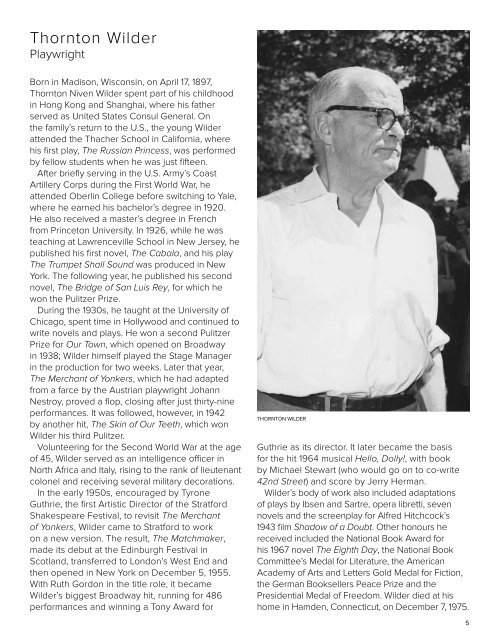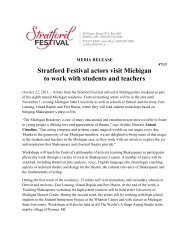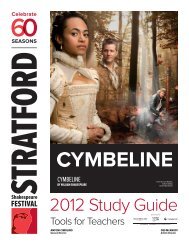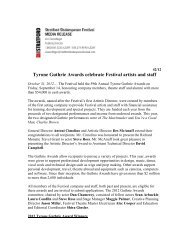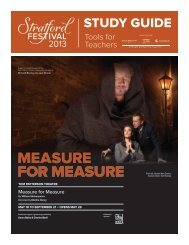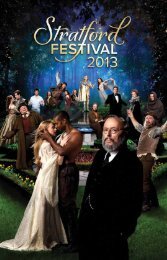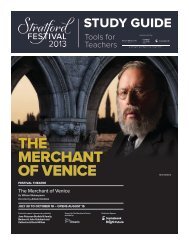Thornton WilderPlaywrightBorn in Madison, Wisconsin, on April 17, 1897,Thornton Niven Wilder spent part of his childhoodin Hong Kong and Shanghai, where his fa<strong>the</strong>rserved as United States Consul General. On<strong>the</strong> family’s return to <strong>the</strong> U.S., <strong>the</strong> young Wilderattended <strong>the</strong> Thacher School in California, wherehis first play, The Russian Princess, was performedby fellow students when he was just fifteen.After briefly serving in <strong>the</strong> U.S. Army’s CoastArtillery Corps during <strong>the</strong> First World War, heattended Oberlin College before switching to Yale,where he earned his bachelor’s degree in 1920.He also received a master’s degree in Frenchfrom Princeton University. In 1926, while he wasteaching at Lawrenceville School in New Jersey, hepublished his first novel, The Cabala, and his playThe Trumpet Shall Sound was produced in NewYork. The following year, he published his secondnovel, The Bridge of San Luis Rey, for which hewon <strong>the</strong> Pulitzer Prize.During <strong>the</strong> 1930s, he taught at <strong>the</strong> University ofChicago, spent time in Hollywood and continued towrite novels and plays. He won a second PulitzerPrize for Our Town, which opened on Broadwayin 1938; Wilder himself played <strong>the</strong> Stage Managerin <strong>the</strong> production for two weeks. Later that year,The Merchant of Yonkers, which he had adaptedfrom a farce by <strong>the</strong> Austrian playwright JohannNestroy, proved a flop, closing after just thirty-nineperformances. It was followed, however, in 1942by ano<strong>the</strong>r hit, The Skin of Our Teeth, which wonWilder his third Pulitzer.Volunteering for <strong>the</strong> Second World War at <strong>the</strong> ageof 45, Wilder served as an intelligence officer inNorth Africa and Italy, rising to <strong>the</strong> rank of lieutenantcolonel and receiving several military decorations.In <strong>the</strong> early 1950s, encouraged by TyroneGuthrie, <strong>the</strong> first Artistic Director of <strong>the</strong> <strong>Stratford</strong>Shakespeare <strong>Festival</strong>, to revisit The Merchantof Yonkers, Wilder came to <strong>Stratford</strong> to workon a new version. The result, The Matchmaker,made its debut at <strong>the</strong> Edinburgh <strong>Festival</strong> inScotland, transferred to London’s West End and<strong>the</strong>n opened in New York on December 5, 1955.With Ruth Gordon in <strong>the</strong> title role, it becameWilder’s biggest Broadway hit, running for 486performances and winning a Tony Award forthornton wilderGuthrie as its director. It later became <strong>the</strong> basisfor <strong>the</strong> hit 1964 musical Hello, Dolly!, with bookby Michael Stewart (who would go on to co-write42nd Street) and score by Jerry Herman.Wilder’s body of work also included adaptationsof plays by Ibsen and Sartre, opera libretti, sevennovels and <strong>the</strong> screenplay for Alfred Hitchcock’s1943 film Shadow of a Doubt. O<strong>the</strong>r honours hereceived included <strong>the</strong> National Book Award forhis 1967 novel The Eighth Day, <strong>the</strong> National BookCommittee’s Medal for Literature, <strong>the</strong> AmericanAcademy of Arts and Letters Gold Medal for Fiction,<strong>the</strong> German Booksellers Peace Prize and <strong>the</strong>Presidential Medal of Freedom. Wilder died at hishome in Hamden, Connecticut, on December 7, 1975.5
Comedy with aSense of AweDirector’s notes by Chris AbrahamIn an essay entitled “Thornton Wilder says Yes,”<strong>the</strong>atre critic and historian Bernard Hewitt asksus to see in Thornton Wilder’s greatest playsa profound affirmation of life. He christensWilder’s best-known play, Our Town, a “hymnto <strong>the</strong> humdrum,” pointing to <strong>the</strong> way in which<strong>the</strong> everyday is elevated to <strong>the</strong> sacred. In TheMatchmaker, Hewitt sees a celebration of <strong>the</strong>“radical, <strong>the</strong> pioneering, <strong>the</strong> exploring, <strong>the</strong>creative spirit in man . . . a lively song in praise ofadventure.” In both plays, he points to <strong>the</strong> presenceof “something eternal” running through <strong>the</strong>m.Hiding out in <strong>the</strong> double takes, mistaken identitiesand reconciliations of The Matchmaker is anunmistakable sense of awe at <strong>the</strong> human spirit – inparticular (but not exclusively) when Wilder is writingabout young people. It’s this sense of awe thatmakes <strong>the</strong> comedy of <strong>the</strong> piece shine with a specialintensity. The Matchmaker affirms <strong>the</strong> beautiful follyof life and love, while at <strong>the</strong> same time avoidingsentimentality with a ten-foot pole. It is also aboutpersonal and social transformation. It recognizesthat we are connected to each o<strong>the</strong>r in ways thatare not always apparent to us. This view of humaninterdependency appears throughout Wilder’s bodyof work as well as his view of <strong>the</strong> <strong>the</strong>atre. In Hewitt’swords, Wilder “recognizes and accepts <strong>the</strong> factthat <strong>the</strong>atre is a collaborative art, that director andactors necessarily intervene <strong>the</strong>ir bodies, minds,and imaginations between <strong>the</strong> playwright and hisvision of his play.”Wilder’s humility and wisdom about <strong>the</strong> <strong>the</strong>atreare evident not only in his journals and letters butalso in <strong>the</strong> complex history of The Matchmaker’sdevelopment from its initial ill-fated 1938 productionas The Merchant of Yonkers to <strong>the</strong> revised andre-titled 1954 version. The ingenious contributionsof Wilder’s collaborators are very much in evidencein <strong>the</strong> prompt script of Tyrone Guthrie’s legendary1954 production of The Matchmaker. It points toa depth of complicity between writer, director,designer and acting company that I always strive forin my work. The acting edition, based on Guthrie’sproduction, was a principal source of inspiration forme. It gave me a window into Guthrie’s inventivedirector chris abrahamproscenium mise-en-scène, as well as into <strong>the</strong>restless perfectionism of <strong>the</strong> director and writer. Ourproduction on <strong>the</strong> <strong>Festival</strong>’s thrust stage is in manyways deeply indebted to and influenced by <strong>the</strong>genius of its first director.It is because I came to understand just howmuch tweaking and fine tuning took place withThe Matchmaker, that we decided to look at threedifferent versions of <strong>the</strong> play, ultimately preparinga text that draws from Guthrie’s prompt script, <strong>the</strong>published play and <strong>the</strong> published edition of TheMerchant of Yonkers. I am tremendously gratefulto Wilder’s nephew and literary executor, TappanWilder, for sensitively and graciously allowing usto nose around <strong>the</strong> three versions of <strong>the</strong> play insearch of fur<strong>the</strong>r insights and omitted gems. It iswith great pleasure that we have been able tore-encounter The Merchant of Yonkers anddiscover just how much <strong>the</strong> success of TheMatchmaker owes this earlier version of <strong>the</strong> play.Who knows why plays don’t always work <strong>the</strong> firsttime around? Sometimes it’s <strong>the</strong> play, sometimesit’s <strong>the</strong> director, <strong>the</strong> times, <strong>the</strong> cast. But more oftenthan not, I think, plays deserve a second chance.The Matchmaker got that second chance, and weare so much <strong>the</strong> richer for it. I hope you’ll enjoy it asmuch as I have.6


